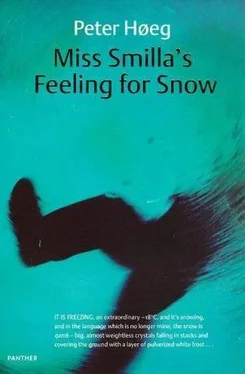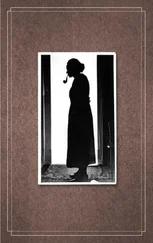Peter Høeg - Smilla's Sense of Snow aka Miss Smilla's Feeling for Snow
Здесь есть возможность читать онлайн «Peter Høeg - Smilla's Sense of Snow aka Miss Smilla's Feeling for Snow» весь текст электронной книги совершенно бесплатно (целиком полную версию без сокращений). В некоторых случаях можно слушать аудио, скачать через торрент в формате fb2 и присутствует краткое содержание. Жанр: Современная проза, на английском языке. Описание произведения, (предисловие) а так же отзывы посетителей доступны на портале библиотеки ЛибКат.
- Название:Smilla's Sense of Snow aka Miss Smilla's Feeling for Snow
- Автор:
- Жанр:
- Год:неизвестен
- ISBN:нет данных
- Рейтинг книги:3 / 5. Голосов: 1
-
Избранное:Добавить в избранное
- Отзывы:
-
Ваша оценка:
- 60
- 1
- 2
- 3
- 4
- 5
Smilla's Sense of Snow aka Miss Smilla's Feeling for Snow: краткое содержание, описание и аннотация
Предлагаем к чтению аннотацию, описание, краткое содержание или предисловие (зависит от того, что написал сам автор книги «Smilla's Sense of Snow aka Miss Smilla's Feeling for Snow»). Если вы не нашли необходимую информацию о книге — напишите в комментариях, мы постараемся отыскать её.
Smilla's Sense of Snow aka Miss Smilla's Feeling for Snow — читать онлайн бесплатно полную книгу (весь текст) целиком
Ниже представлен текст книги, разбитый по страницам. Система сохранения места последней прочитанной страницы, позволяет с удобством читать онлайн бесплатно книгу «Smilla's Sense of Snow aka Miss Smilla's Feeling for Snow», без необходимости каждый раз заново искать на чём Вы остановились. Поставьте закладку, и сможете в любой момент перейти на страницу, на которой закончили чтение.
Интервал:
Закладка:
People live so close together in Northern Greenland. Sleeping many to a room. Hearing and seeing everyone else at all times. The community is so small. There were 600 people spread among twelve settlements the last time I was home.
In contrast to this is nature. Every hunter, every child is gripped by a wild delirium whenever he walks or rides away from the settlement. First there's the feeling of a rising energy bordering on madness. Then comes a peculiar sense of clarity.
I know it's funny. But here in Copenhagen Harbor, at two in the morning, this feeling of clarity comes over me. As if it somehow came from the ice and the night sky and the relatively open space:
I think about what has happened to me since Isaiah's death.
I see Denmark before me like a spit of ice. It's drifting, but it holds us frozen solid in the ice floes, in a fixed position in relation to everyone else.
Isaiah's death is an irregularity, an eruption that produced a fissure. That fissure has set me free. For a brief time, and I can't explain how, I have been set in motion, I have become a foreign body skating on top of the ice.
The way I am now skating across Copenhagen Harbor, dressed in a clown hat and borrowed shoes.
From this angle a new Denmark comes into view. A Denmark that consists of those who have partially wrested themselves free of the ice.
Loyen and Andreas Licht, driven by different forms of greed.
Elsa Lübing, Lagermann, Ravn, bureaucrats whose strength and dilemma is their faith in a corporation, in the medical profession, in a government apparatus. But who, out of sympathy, eccentricity, or for some incomprehensible reason, have circumvented their loyalty to help me.
Lander, the rich businessman, driven by a desire for excitement and a mysterious sense of gratitude.
That is the beginning of a social cross section of Denmark. The mechanic is the skilled worker, the laborer. Juliane is the dregs. And I-who am I? Am I the scientist, the observer? Am I the one who has been given the chance to get a glimpse of life from the outside? From a point of view made up of equal parts of loneliness and objectivity?
Or am I only pathetic?
In the channel the grease ice is held together with a thin, dark, disintegrating crust of ice, what's called "rotten ice," dissolving and crumbling from below. I walk along the dark edge, down toward the White Palace, until I find a floe that's big enough. I step onto it and then onto the next. There's a slight movement with the current, down through the harbor, of maybe half a knot, rocking, lethal. I leap the last part of the way from floe to floe. I don't even get my feet wet.
The windows of the White Palace are dark. The entire complex seems to be in a sleep that also encompasses the walls, the playground, the stairways, the naked trunks of the trees. From the canal I come up behind the bicycle sheds, slowly and cautiously. I stop there.
I look at the parked cars. At the dark entryways. There is no movement. Then I look at the snow. The thin, fine layer of newly fallen snow.
There is no moon, so it takes time before I notice them. A single row of footprints. He came across the bridge and went behind the building. On this side of the playground the footprints are visible. A Vibram sole under a large person. They lead in under the shed roof in front of me, and they don't come back out.
Then I can feel him. There's no sound, no smell, nothing to see. But the tracks have made me resonant to his presence, to the certainty of a looming threat.
We wait for twenty minutes. When the cold makes me start shaking I pull away from the wall so I won't make any noise. Maybe I should give up and go back the way I came. But I stay. I detest fear. I hate being scared. There is only one path to fearlessness. It's the one that leads into the mysterious center of the terror.
For twenty minutes there is only soundless waiting. At 9" Fahrenheit. My mother could handle that. Most Greenlandic hunters can manage it any time. I can pull it off on rare occasions. For most Europeans it would be tmthinkable. They would shift their weight, clear their throat, cough, rustle their overcoat.
The man whose presence I sense less than a yard away must be convinced that he's alone, that no one can hear or see him. And yet he is as soundless as if he never existed.
But not for one second am I tempted to move, to give in to the cold. Like one long, internal shriek my senses tell me that someone is waiting there. That he's waiting for me.
I don't even hear him leave. I close my eyes for a moment because the cold has made them run. When I open them, a shadow has torn away from the shed roof and is moving off. A tall figure with a quick, fluid gait. And above his head, like a halo or a crown, something white, maybe a hat.
There are two ways to tag polar bears. The usual way is to stun them from a helicopter. The machine drops down directly over the bear, you lean out of the cockpit, and the instant that the air pressure from the rotor strikes the animal, it falls to the ground and you shoot.
Then there's the other method that we used on Svalbard. From a snowmobile-"the Viking way." You shoot with a custom air rifle made by Neiendamm in southern Jutland. This method requires you to get close, less than fifty yards away. Less than twenty-five is better. The moment the bear stops and turns around, you get a good look at it. Not one of those living carcasses that amuse you at the zoo, but a polar bear, the one from the Greenlandic coat of arms, colossal, three-quarters of a ton of muscle, bone, and teeth. With an extreme, lethal ability to explode. A wild animal that has existed for only 20,000 years, and in that time has known only two types of mammals: its own species and its prey.
I have never missed. We used bullets in which a gas device injected a large dose of Zolatil. The bear fell almost instantaneously. But not for a moment was I free of the panicky, hair-raising fear.
It's the same feeling now. What is moving away from me is only a shadow, a stranger, a person who is not aware of my presence. But the hair on my skin, which is numb from the cold, is standing on end like spines on a porcupine.
I reach the stairway through the basement rooms. The, mechanic's door is locked, and the tape is in place.
The door of Juliane's apartment is standing open. As I pass, she comes out onto the stairs.
"You're going away, Smilla."
She looks weak and helpless. But I hate her, anyway.
"Why didn't you tell me about Ving?" I say. "That he came and picked up Isaiah?"
She starts to cry. "The apartment. He gave us the apartment. He's a big shot with the housing authority. He could take it away again. He said that himself. Aren't you coming back?"
"Of course I am," I say.
It's true. I'll have to come back. She's the only thing left of Isaiah. Just as, for Moritz, I'm his only connection with my mother.
I walk up to my own floor. The tape hasn't been touched. I let myself in. Everything is the way I left it. I gather up only the most essential clothes. They fill two suitcases, which weigh so much that I would have to call a moving van. I try to repack them. It's difficult, because I don't dare turn on a light but work by the reflection from tile city's lights on the snow outside. Finally I limit myself to one large duffel bag. But not without heart-rending sacrifices.
Standing in the middle of the room, I take one last look around. I pick up Isaiah's cigar box and put it in the bag. I say a brief mental farewell to my home.
Then the phone rings.
Of course I should just let it ring. I promised the mechanic not to come up here. And I wouldn't want to talk to the police. Everything else can wait. I should just let it ring,. I have everything to lose and nothing to gain.
Читать дальшеИнтервал:
Закладка:
Похожие книги на «Smilla's Sense of Snow aka Miss Smilla's Feeling for Snow»
Представляем Вашему вниманию похожие книги на «Smilla's Sense of Snow aka Miss Smilla's Feeling for Snow» списком для выбора. Мы отобрали схожую по названию и смыслу литературу в надежде предоставить читателям больше вариантов отыскать новые, интересные, ещё непрочитанные произведения.
Обсуждение, отзывы о книге «Smilla's Sense of Snow aka Miss Smilla's Feeling for Snow» и просто собственные мнения читателей. Оставьте ваши комментарии, напишите, что Вы думаете о произведении, его смысле или главных героях. Укажите что конкретно понравилось, а что нет, и почему Вы так считаете.




![Рута Шепетис - Ashes in the Snow [aka Between Shades of Gray]](/books/414915/ruta-shepetis-ashes-in-the-snow-aka-between-shades-thumb.webp)







